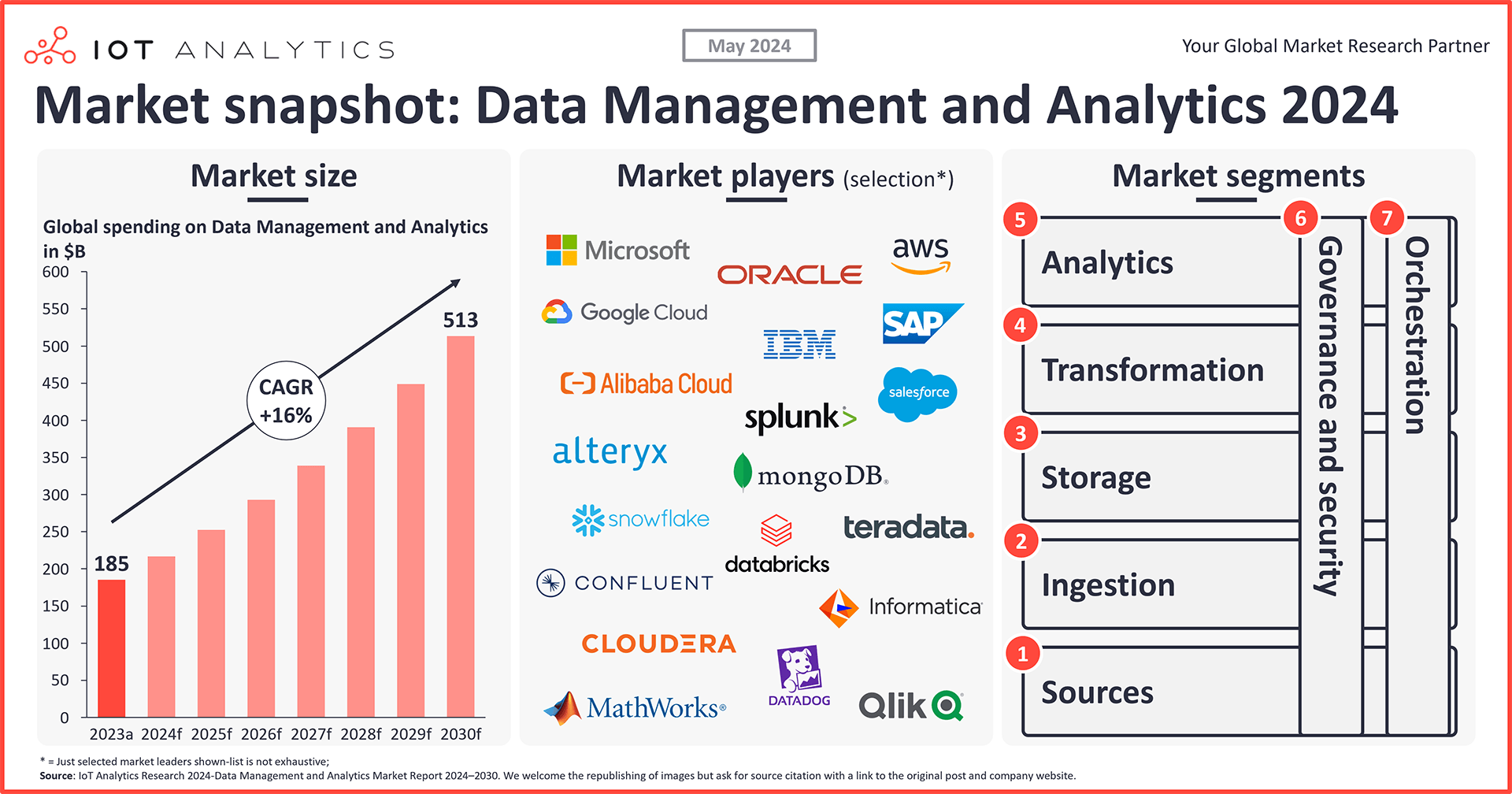
AI Data Management refers to the application of artificial intelligence, including Generative AI, to optimize an organization’s data handling. This spans collection, storage, analysis, and decision-making. By integrating AI into data management processes, companies can significantly enhance data quality, streamline operations, and make more informed business decisions.
At its core, AI data management ensures data integrity, security, and accessibility, keeping data accurate, consistent, and up to date. This not only improves regulatory compliance but also provides a competitive edge by leveraging real-time insights for strategic decisions.
As AI continues to evolve, the next generation must understand its impact. What kids need to know about AI includes how AI works, its potential in problem-solving, and its growing influence across industries, preparing them for a future shaped by AI technologies.
Data Management and Analytics 2024

AI is set to drive substantial growth in the data management sector, with the market projected to reach $513.3 billion by 2030, as reported by IoT Analytics. Effective AI models depend on a strong data management foundation built around seven key components: 1. data sources, 2. ingestion, 3. storage, 4. transformation, 5. analytics, 6. governance and security, and 7. orchestration. While hyperscalers hold over 50% of the market share, several emerging data management vendors are excelling in specialized segments, offering innovative solutions.
Key Benefits of AI in Data Management
1. Data Cleaning and Quality Improvement
AI algorithms excel at detecting and correcting errors, inconsistencies, and duplications in datasets. This ensures that the data being used for analysis is both accurate and reliable. By automating the data cleaning process, businesses can significantly enhance efficiency and decision-making. Staying updated with top AI news is essential for understanding how these innovations continue to evolve, helping organizations stay ahead in leveraging AI for data management and other critical functions.
- Reduce human errors and inaccuracies in datasets.
- Improve data quality, leading to better decision-making.
- Save valuable time by avoiding manual data scrubbing.
2. Noise Reduction: Filtering the Relevant Information
One of the challenges of data management is dealing with irrelevant or noisy data, which can obscure valuable insights. AI helps by filtering out unnecessary information and focusing only on the data that matters. This allows businesses to:
- Eliminate data noise and avoid distractions from irrelevant metrics.
- Extract meaningful insights faster, boosting efficiency and productivity.

3. Handling Missing Data with AI
Missing data can distort analyses and lead to flawed conclusions. AI offers solutions like imputation and predictive modeling, which estimate missing values to create more accurate datasets. By handling missing data efficiently, AI allows businesses to:
- Conduct more robust analyses.
- Minimize the impact of incomplete data on decision-making.
4. Trend Detection and Predictive Insights
AI-powered analytics tools are excellent at identifying trends, patterns, and correlations within large datasets that might not be immediately apparent to human analysts. By recognizing these hidden insights, organizations can:
- Anticipate market shifts and adjust their strategies proactively.
- Gain a competitive edge through data-driven decision-making.
How AI Automation Enhances Data Management

Automation including robotics for kids, plays a crucial role in enhancing AI data management by relieving data professionals of repetitive tasks and accelerating various processes. Here’s how AI-powered automation transforms data management.:
- Automated Data Collection and Integration: AI streamlines the process of collecting data from various sources and automatically integrates it into a single system. This ensures data consistency and eliminates manual errors.
- Faster Data Processing: AI systems can analyze massive datasets in a fraction of the time it would take humans, allowing for quicker decision-making.
- Compliance Monitoring: AI helps businesses maintain compliance with legal and ethical standards by tracking how data is used and flagging potential violations.
How AI Drives Data Analysis

AI is highly effective at analyzing data, offering powerful tools that can process vast, complex datasets. Here are some specific ways AI enhances data analysis:
1. Better Data Interpretation
AI can automatically classify and organize data, making it easier to understand and use. This is particularly helpful for unstructured data such as text, images, or video, which traditional methods struggle to analyze efficiently.
2. Advanced Pattern Recognition
AI can identify hidden patterns and correlations in large datasets, enabling businesses to derive valuable insights. This is especially useful for financial markets, healthcare, and marketing strategies.
3. Predictive Analytics
Machine learning models, a subset of AI, can predict future outcomes based on historical data. This capability is essential for forecasting demand, assessing risks, and predicting customer behavior.
Practical Uses of AI in Data Management

1. Data Integration and Transformation
AI can automate the integration of data from various sources, ensuring that it is consistent and ready for analysis. This is especially valuable for large organizations dealing with different types of data.
2. Data Classification and Tagging
AI systems can categorize and tag data based on its content, making it easier to find and retrieve. This reduces time spent searching for information and improves overall data accessibility.
3. Enhanced Data Security
AI plays a significant role in data security, identifying unusual patterns or activities that could signal a security breach. Machine learning models can monitor network traffic in real time and act quickly to prevent cyberattacks.
4. Optimized Data Storage
AI algorithms help optimize data storage by automatically moving less frequently accessed data to cheaper storage solutions. This reduces costs while maintaining accessibility to critical data.
Conclusion
Incorporating AI into data management processes enables organizations to work more efficiently, improve data quality, and make smarter, faster decisions. From automating data cleaning to identifying trends and ensuring data security, AI offers numerous advantages that modern businesses can’t afford to ignore. As AI technology continues to evolve, its applications in data management will only become more powerful, helping businesses unlock new opportunities and achieve greater success.
Looking for a comprehensive parenting guide to ensure you are on the right track? Explore a wealth of parenting wisdom and educational insights in Moonpreneur’s blogs. Additionally, you can join our programs that nurture the next generation of innovators. Book a free trial now!


























One thing I’d like to add is the potential impact on sustainability. With AI helping reduce data storage costs and optimizing resources, it could also help reduce energy consumption in data centers.
Can you provide more practical, real-world examples of how smaller businesses can actually implement AI for data management. Not all companies have the budget or infrastructure to adopt AI right away, so it would be great to see more advice for those who are just starting out.
Small businesses can use no-code AI tools like Google Sheets with AI add-ons for automating data entry, organizing customer data, or predicting sales trends. These affordable solutions help manage data without having a technical team.